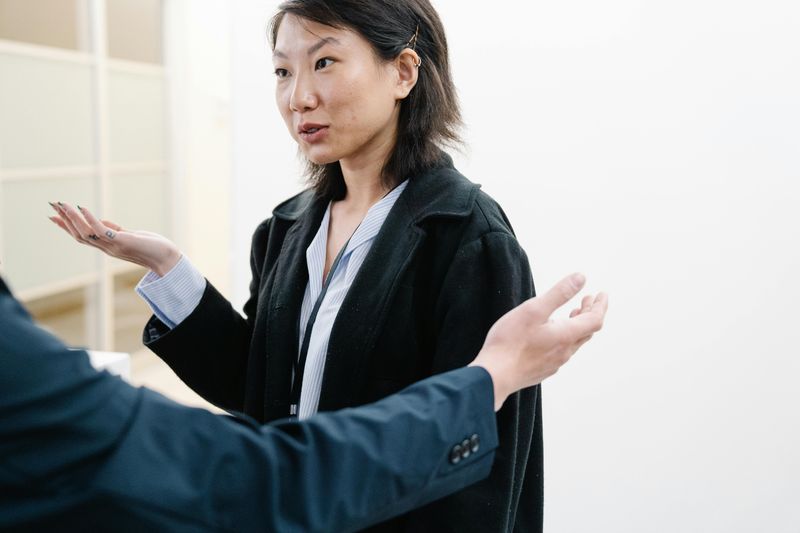Have you ever wondered what makes some people radiate confidence while others seem to shrink in social situations? The truth is, confidence isn’t just about big, bold actions – it shows up in the small things we do every day. Your daily habits and reactions speak volumes about how comfortable you feel in your own skin. These eight behaviors might reveal more about your confidence level than you realize.
1. Posture and Body Language

Watch someone enter a room and you’ll instantly get clues about their confidence level. Those who stand tall with shoulders back and chest open aren’t just demonstrating good posture – they’re silently communicating self-assurance to everyone around them.
Confident individuals take up appropriate space without apology. Their movements tend to be deliberate rather than fidgety, and they maintain an open stance rather than crossing arms defensively. Even sitting positions reveal inner confidence – leaning slightly forward shows engagement while slouching suggests discomfort.
Next time you’re feeling unsure, try the ‘power pose’ technique: stand tall with your feet shoulder-width apart for just two minutes. Research suggests this simple adjustment can actually boost confidence-creating hormones in your body.
2. Eye Contact

Looking someone in the eye isn’t always easy, but it speaks volumes about your self-assurance. Confident people maintain comfortable eye contact during conversations – not staring intensely, but connecting genuinely.
Ever noticed how someone with low confidence might look at the floor, their phone, or anywhere but at you? Their shifting gaze reveals inner discomfort. In contrast, those with healthy confidence levels hold steady eye contact that says ‘I’m present and engaged’ without becoming intimidating.
Cultural differences matter here too. Some cultures consider direct eye contact respectful, while others view it as challenging. The key isn’t the duration but the quality – warm, attentive eye contact that makes others feel valued rather than scrutinized.
3. Voice That Carries Conviction

Your voice reveals more about your confidence than the words you choose. Someone brimming with self-assurance speaks at a measured pace with clear articulation and appropriate volume. No need for shouting – their calm, steady delivery commands attention naturally.
Listen for those telltale signs of low confidence: the voice that trails off at sentence ends, excessive ‘umms’ and ‘uhhs,’ or the habit of turning statements into questions with rising intonation. These vocal patterns undermine authority and suggest the speaker doesn’t fully believe in their own message.
The good news? Voice qualities can be developed with practice. Recording yourself speaking and then listening critically can help identify patterns that might be diminishing your impact in conversations.
4. Listening Without Agenda

Surprisingly, true confidence often shows up in silence. Secure individuals listen attentively without feeling the need to hijack conversations or constantly redirect attention to themselves. They’re comfortable giving others the spotlight.
Notice how someone with shaky confidence might interrupt frequently or mentally rehearse their next comment instead of truly hearing others. Authentic listeners, by contrast, ask thoughtful follow-up questions and reference earlier points, showing they were genuinely engaged rather than waiting for their turn to speak.
This quiet confidence manifests in patience – allowing pauses in conversation without rushing to fill them. The next time you’re chatting with someone, try counting to three in your head before responding. This small habit builds listening skills while demonstrating your comfort with conversational silence.
5. Owning Mistakes Without Drama

Remember that project that went sideways last month? How someone responds to failure reveals volumes about their confidence foundation. Those with genuine self-assurance can say ‘I made a mistake’ without adding qualifiers, excuses, or dramatic self-flagellation.
Confident people view errors as valuable data points rather than character indictments. They separate their actions from their identity, allowing them to acknowledge missteps without feeling diminished. This healthy perspective enables them to apologize sincerely, fix what can be fixed, and move forward constructively.
The truly confident also resist the urge to hide mistakes or shift blame to others. Their security doesn’t depend on appearing perfect – instead, they understand that acknowledging errors actually builds respect and trust with others.
6. Comfortable With Silence

Silence makes many people squirm, but confident individuals embrace these quiet moments. They don’t feel compelled to fill every conversational gap with nervous chatter or forced small talk.
This comfort with silence stems from inner security – not needing constant external validation or attention. Confident people understand that meaningful pauses allow for reflection, processing, and deeper connection. They recognize when silence is productive rather than awkward.
The habit of allowing comfortable silence extends beyond conversations. Confident people often enjoy solitude and can be alone with their thoughts without constant distraction from devices or background noise. They’ve developed a friendship with themselves that doesn’t require continuous external input to feel at ease.
7. Gracefully Accepting Praise

‘Your presentation was excellent!’ How do you respond to compliments like this? The confident person simply smiles and says ‘Thank you’ without diminishing the praise or launching into explanations about how it could have been better.
Those struggling with confidence often deflect compliments, saying things like ‘It was nothing’ or ‘I just got lucky.’ This reaction stems from discomfort with positive attention or feeling undeserving of recognition. Confident individuals, however, can accept praise as a gift – acknowledging it graciously without letting it define their worth.
There’s an art to receiving compliments well. The next time someone praises your work, try responding with a simple ‘I appreciate that’ instead of downplaying your effort. This small shift honors both the giver’s perspective and your own accomplishments.
8. Responding to Criticism With Curiosity

Feedback stings sometimes – there’s no way around it. Yet confident people approach criticism with curiosity rather than defensiveness. When someone points out an area for improvement, they lean in with questions instead of excuses.
This doesn’t mean they accept every critique as gospel truth. Confident individuals filter feedback thoughtfully, considering the source and context before deciding what to incorporate. They maintain healthy boundaries while remaining open to growth opportunities.
The key difference lies in how criticism affects their self-image. Someone with shaky confidence might feel devastated by constructive feedback, seeing it as confirmation of their inadequacy. The confident person, however, separates performance from identity – understanding that improving a skill doesn’t mean they were fundamentally flawed to begin with.

Comments
Loading…